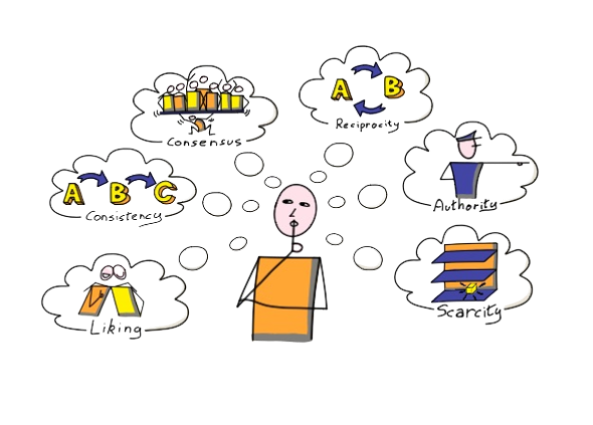It’s written in the Bible (Matthew 7-7), “Ask, and it shall be given to you”.
However, in 1990, a 25-year-old woman was too shy to ask for a pen during a long train ride from Manchester to London. “To my immense frustration, I didn't have a functioning pen with me, and I was too shy to ask anybody if I could borrow one” she writes in her blog.
During the journey, she had a great idea for a new book and new character. Since she couldn't write anything down, she spent the four-hour journey working out her idea. “I think, now, that this was probably a good thing, because I simply sat and thought, for four (delayed train) hours, and all the details bubbled up in my brain, and this scrawny, black-haired, bespectacled boy who didn’t know he was a wizard became more and more real to me.”
If you haven’t already guessed, the woman was JK Rowling and the black-haired boy with glasses was Harry Potter.

‘Don't ask, don't get’ is attributed to the greatest Indian politician and globally-respected hero, Mahatma Gandhi. I don’t know when he made this statement. Perhaps he politely asked the British Lords in 1930 if Britain was prepared to hand over power in India, the jewel in the crown, to the Indian people? Gandhi only got the promise of transfer of power at the end of the Second World War as a result of persistent and non-violent resistance against the colonial authorities. So Gandhi was able to turn a ‘no’ into a ‘yes’. He asked and it was given.
TRAMPOLINE
You already have a no. You can get a yes. The key question then is how can you increase the chance of getting a yes as an answer?
A while ago, our 12-year-old daughter Sofie gave us a master class in this. She wanted a trampoline and had done so for a long time. My wife and I always replied in the negative, citing rational arguments. A trampoline is dangerous. One in five of all emergency admissions for children playing or playing sports are due to trampoline accidents. The trampoline takes up a lot of space in the garden and will kill the grass. We have nowhere to store the trampoline in the winter. Sofie understood the arguments, but didn’t give up. She did a masterstroke. She contacted her grandfather who lives alone a little way away. “Dearest grandpa in the whole world” she said, “Can we have a trampoline in your garden? I'll pay part of the amount myself and I promise to visit you several times a week. And after jumping on the trampoline, I'll come and sit with you on the sofa and have a nice chat”. Of course Grandpa couldn't say no...
In the book Influence, the Psychology of Persuasion by American Professor of Psychology Robert B. Cialdini, we learn about six ways of influencing others to procure a greater chance of getting a yes from our interlocutor. It’s remarkable that all of Cialdini's recommendations are applied naturally by children. Granddaughter Emma desperately wants new rollerskates and tries to convince her grandfather:
- Reciprocity: “Grandpa, I made a beautiful drawing for you. Will you get me rollerskates for my birthday?”
- Consistency: “Grandpa, you always give me so many nice presents for my birthday. Will I get rollerskates this year?”
- Consensus: “Grandpa, every one of my friends has these new rollerskates. Can I have rollerskates too?”
- Liking: “Grandpa, you're the sweetest grandpa in the world and you look so young. Can I have those rollerskates?”
- Authority: “Grandma says these rollerskates are very sturdy. Can you get them for me?”
- Scarcity: “I've wanted those skates for so long and now they're almost sold out. Grandpa, please, will you come to the shop with me now?”
Let's take a closer look at these six forms of influence…
FORMS OF INFLUENCE
The rule of reciprocity is a fundamental principle in our social relationships. We feel obliged to send a card back to those who include New Year wishes in Christmas cards. The rule can be used by clever people for their own benefit. If someone requests something big that you turn down, they make a smaller request. For example, someone from the youth movement comes to your door and asks you to buy a €25 box of chocolates to help raise money. You refuse so they then suggest you buy a €5 lottery ticket instead. You can’t keep refusing so you buy the ticket that you’re unlikely to have bought if you hadn’t refused the box of chocolates.
In his book Influence, Cialdini describes the Watergate affair where the Democratic Party HQ was broken into to install bugging devices – and which forced President Richard Nixon to resign. Although the cards were in his favour for re-election, this risky operation was decided upon. Why? Because earlier plans by G. Gordon Liddy, in charge of covert operations for the re-election of the president, were rejected. These plans included equipping fighter planes with listening devices and blackmailing Democratic Party members with expensive call girls – and four times more expensive than the bugging equipment at Party HQ. After all the refusals, the other members of the committee felt obliged to grant this last, particularly daring, request.
Consistent people are often seen as strong and intelligent. Therefore, once a choice has been made, we continue to defend this choice and adapt our behaviour accordingly. The art of influence therefore, is to lure your ‘victim’ into making a choice. Petitions often look innocent, but they’re not. By signing an appeal, you make a choice and this can influence your behaviour. Suppose you sign a well-intentioned petition against animal cruelty. You do this along with some friends. Will you order goose liver the next time you go to a restaurant with the same friends? It’s well-known that New Year's resolutions are better followed when people write down their goals or share them. All thanks to the principle of consistency.
It’s therefore important for salespeople to get a foot in the door. In sales training, it’s emphasised that the first question on a sales call should be to ask if all is going well with the potential buyer. If they answer is ‘yes, thank you’, it will be more difficult for them to refuse a subsequent offer. Cialdini cites the example of a test in Texas where people were phoned asking if someone could visit to sell biscuits for charity. Eighteen per cent agreed. When the salesperson first inquired about their health and wellbeing, the percentage of positive responses rose to 32 percent. Finally, almost everyone bought the biscuits in accordance with the principle of consistency.
People decide how to act based on what other people do in a given situation, especially in exceptional or uncertain situations. For example, when you get off a plane and arrive in an unfamiliar terminal, you often just follow the people ahead. Advertisers love the power of the big number. A well-known slogan of a Belgium supermarket chain was “One million customers. You have to earn that, every day”. Just like in a sitcom, you have a punch line and in theatres, you have to applause masters, it’s important to get people moving. American entrepreneur Sylvan Goldman experienced this when he ran a few grocery shops called ‘Humpty Dumpty’ with his brother. He noticed that customers stopped shopping when their baskets were too heavy. So he invented the shopping trolley. But despite being easy to use, customers didn’t want to use them. Then Goldman hired men and women of all ages to walk around their stores with the shopping trolleys. He died a multi-millionaire.
In a court of law, a defence lawyer will always try to elicit sympathy for his client from the judge or jury. If we feel sympathy for someone, they have an edge. Sympathy can be gained by excelling (if you’re physically attractive, have a doctorate degree or wear a uniform), praising or because you’re similar. Research has shown that election candidates with common names like ‘Smith’ or ‘Jones’ have a head start. One of the most cunning sales tricks that uses sympathy are parties that sell products direct. A friend calls you to spend an evening with her. A sales rep will be present too, but some of the proceeds will go to your friend. Difficult to refuse this, isn’t it?

In today’s society, there’s strong pressure to accept and follow guidelines directed by authority, even if they go against your own values and preferences. The worldwide COVID-19 pandemic was further proof of this. Governments, based on scientific advice, could force entire populations to avoid social contact for weeks or months and stay at home as much as possible. In his book, Cialdini also cites Stanley Milgram's well-known scientific study. In this test, volunteers were forced by the experiment leader (the authority) to administer an electroshock to a student after giving a wrong answer. The volunteers didn’t know that the pupils were actors. It was estimated in advance by Milgram and his colleagues that only a small proportion of the volunteers would agree to electroshock, especially as the voltage was increased and the pupils begged it to stop. But the experiment leader urged the volunteer to continue and, in two-thirds of the cases, the volunteer obeyed.
People attach more value to things that are more difficult to obtain. Websites make good use of this principle to put pressure on people to buy. You see lines like “Only five items available” or “Six other people are also booking a room at this hotel right now”. As things become less accessible, we lose certain freedoms of choice. The scarcity principle generates a lot of excitement and is difficult to keep in check, especially when certain objects used to be sufficiently available and then became difficult to obtain.
It doesn’t always have to be an object either. It can also be rights. Back to the Coronavirus crisis. In the spring of 2020, the first lockdown was widely supported by the population. Hospital staff were applauded and feted as heroes. In the summer, the rules were relaxed considerably but, in the autumn, the virus surged and the European authorities were obliged to proceed to a second lockdown, but this time many people were reluctant to comply.
Now for the quiz question… which of the six ways of influencing people did Sofie use to convince her grandfather to install a trampoline in his garden?

